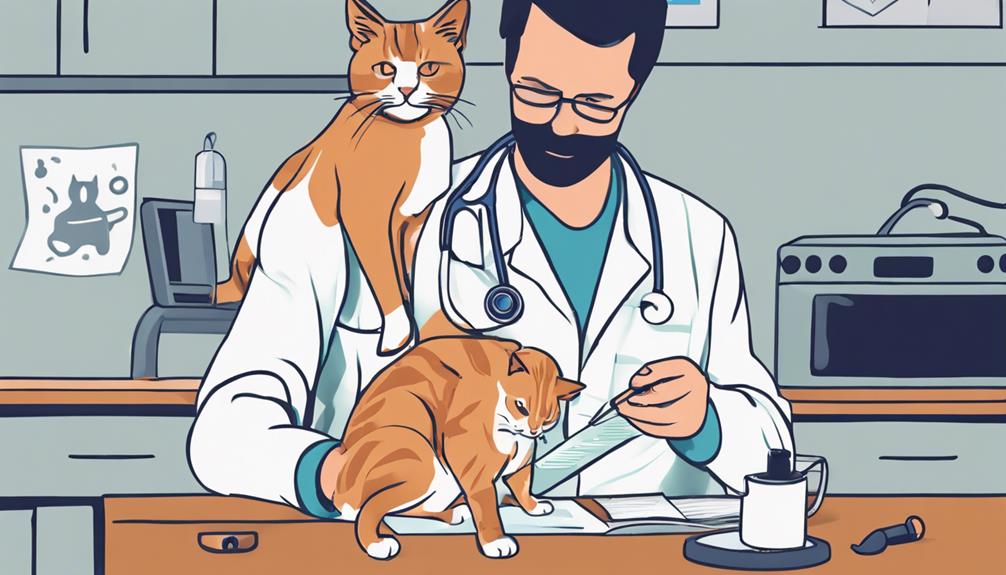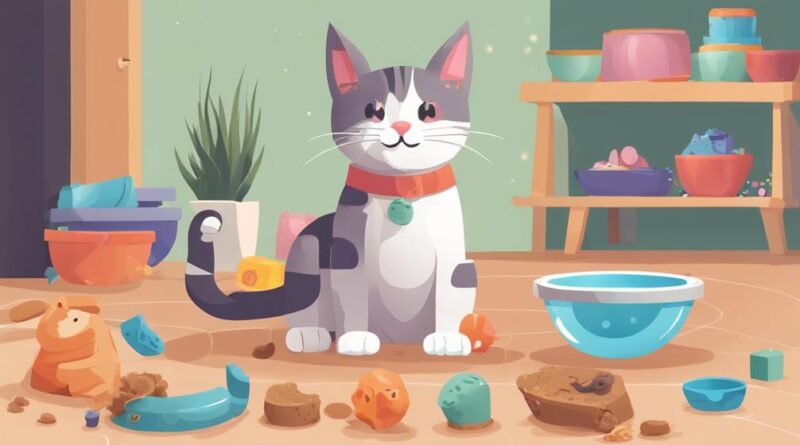12 Effective Tips to Combat Cat Constipation
You may not be aware that constipation in cats can be a common and uncomfortable issue that requires attention. When your feline friend is experiencing this problem, it can be concerning and stressful for both of you.
However, with the right care and strategies, you can help alleviate your cat's discomfort and promote better bowel health. By implementing these 12 effective tips, you can make a significant difference in your cat's well-being and quality of life.
Understanding Cat Constipation
If your feline friend is struggling to pass stool, understanding cat constipation is crucial for their health and well-being. There are several causes of cat constipation, with one common reason being inadequate water intake. Cats that don't drink enough water may experience difficulty passing stool, leading to constipation. Another cause could be a lack of dietary fiber, which is essential for maintaining healthy digestion. Additionally, certain medical conditions such as kidney disease or neurological issues can contribute to constipation in cats. Understanding these causes can help you address the root of the problem and provide the necessary treatment options.
When it comes to treating cat constipation, there are various options available to help alleviate your feline companion's discomfort. One effective treatment is to increase your cat's water intake by providing fresh water sources throughout the house or incorporating wet food into their diet. Ensuring they stay hydrated can help soften their stool and make it easier for them to pass. Adding fiber to their diet through specialized cat food or supplements can also aid in promoting regular bowel movements. In more severe cases, your veterinarian may recommend laxatives or enemas to help relieve constipation and prevent any complications. By understanding the causes and exploring these treatment options, you can effectively manage and combat cat constipation for a happier and healthier pet.
Identifying Symptoms Early
To spot cat constipation early, observe your feline friend for signs of discomfort or changes in their bathroom habits. Preventive care plays a crucial role in maintaining your cat's digestive health. Keep an eye out for symptoms such as infrequent bowel movements, straining in the litter box, producing hard or dry stools, or vocalization during defecation. If you notice any of these signs, it's essential to take action promptly to prevent the condition from worsening.
Early treatment is key to managing cat constipation effectively. Once you recognize the symptoms, consult your veterinarian for guidance on the best course of action. They may recommend dietary changes, increased water intake, or prescribed medications to alleviate constipation. By addressing the issue early on, you can help prevent complications and discomfort for your cat.
In addition to monitoring your cat's bathroom habits, pay attention to their overall behavior. Lethargy, loss of appetite, vomiting, or a hunched posture can also indicate constipation. Regular check-ups with your vet can aid in early detection and intervention if your cat is prone to constipation.
Importance of Hydration
Staying hydrated is crucial for maintaining your cat's digestive health and preventing constipation. Adequate water consumption is essential to ensure that your cat's stool stays soft and easy to pass. Cats aren't always great drinkers, so you need to encourage them to drink water regularly. One way to do this is by providing fresh water in a clean bowl every day. You can also try using a pet fountain, as some cats prefer running water.
In addition to water consumption, electrolyte balance plays a vital role in your cat's hydration levels. Electrolytes are minerals that help regulate fluid balance in the body. Sodium, potassium, and chloride are essential electrolytes that support proper hydration. If your cat becomes dehydrated, their electrolyte levels can become imbalanced, leading to further complications such as constipation.
Monitoring your cat's water intake is crucial, especially if they're prone to constipation. Keep an eye out for signs of dehydration, such as dry gums, sunken eyes, or lethargy. If you suspect that your cat isn't drinking enough water, consult your veterinarian for guidance on how to increase their water consumption. Remember, proper hydration is key to maintaining your cat's overall health and preventing constipation.
Dietary Adjustments for Relief
Consider incorporating more fiber-rich foods into your cat's diet to help alleviate constipation and promote regular bowel movements. Fiber sources such as canned pumpkin, cooked sweet potato, or green beans can be mixed into your cat's meals to increase their fiber intake. These ingredients can aid in softening the stool and easing the passage through the digestive tract.
Meal timing also plays a crucial role in combating cat constipation. Ensure that your cat is receiving regular meals at consistent times each day. This helps regulate their digestive system and promote more predictable bowel movements. Additionally, try not to skip or delay meals as this can disrupt their digestive rhythm and contribute to constipation issues.
When adjusting your cat's diet to alleviate constipation, it's essential to do so gradually. Abrupt changes can lead to gastrointestinal upset. Introduce new fiber-rich foods slowly and monitor how your cat responds to the dietary modifications. If you notice any adverse effects, consult your veterinarian for further guidance on the best approach to address your cat's constipation through dietary adjustments.
Regular Exercise for Bowel Health
Incorporate regular play sessions and interactive toys into your cat's daily routine to promote bowel health through increased physical activity. Cats, especially indoor ones, may not get enough exercise, which can lead to constipation. Engaging your cat in a consistent playtime routine not only keeps them mentally stimulated but also encourages movement that can aid in bowel movements. Interactive toys like feather wands, laser pointers, or puzzle feeders can help get your cat moving and alleviate constipation issues.
Regular exercise is crucial for maintaining your cat's overall health and well-being. By incorporating indoor activities that promote physical activity, you're helping to regulate their digestive system and prevent constipation. Make it a habit to set aside dedicated time each day for play sessions to ensure your cat stays active. Climbing towers, scratching posts, and even simple toys like balls or catnip mice can encourage movement and prevent your cat from becoming sedentary.
Incorporating Fiber in Diet
To further support your cat's bowel health, ensure to introduce fiber into their diet to aid in digestion and prevent constipation. Fiber plays a crucial role in maintaining healthy digestion by promoting regular bowel movements and preventing the formation of hard stools.
Here are some effective ways to incorporate fiber into your cat's diet:
- Fiber supplements: Consider adding fiber supplements specifically designed for cats to their meals. These supplements can help increase your cat's fiber intake, aiding in smoother digestion and reducing the likelihood of constipation.
- Natural remedies: Opt for natural sources of fiber such as pumpkin puree or steamed vegetables like green beans and carrots. These natural remedies not only provide essential nutrients but also contribute to your cat's daily fiber requirements.
- High-fiber cat food: Invest in high-quality cat food that's rich in fiber. Look for brands that list fiber as one of the main ingredients to ensure your cat receives an adequate amount of fiber in their regular diet.
Veterinary Consultation and Treatment

When seeking veterinary consultation and treatment for your cat's constipation, prioritize scheduling an appointment promptly to address any underlying issues effectively. Your veterinarian is a crucial source of veterinary expertise and will be able to recommend the most suitable treatment options for your furry friend. Upon visiting the vet, they'll conduct a thorough examination to determine the cause of your cat's constipation. This may involve feeling your cat's abdomen for any abnormalities, checking their medical history, and possibly running additional tests such as blood work or X-rays.
Based on their evaluation, the veterinarian may suggest various treatment options to alleviate your cat's constipation. These could include dietary changes, medications, or in severe cases, procedures like enemas or manual disimpaction. It's essential to follow your vet's recommendations closely to ensure the best outcome for your cat.
Moreover, your vet can provide valuable guidance on preventive measures to reduce the likelihood of constipation reoccurring in the future. They may advise you on long-term dietary adjustments, hydration strategies, or lifestyle changes that can benefit your cat's overall digestive health.
Monitoring Progress and Preventing Recurrence
To ensure your cat's ongoing well-being, regularly monitoring their progress and implementing preventive measures to avoid constipation recurrence is crucial. Keeping a close eye on your feline friend's health can help catch any early signs of constipation and prevent it from becoming a recurring issue. Here are some tips to help you effectively monitor progress and prevent future episodes:
- Progress Tracking: Keep a daily log of your cat's bowel movements to track any changes in frequency or consistency. This can help you identify patterns and alert you to any potential issues early on.
- Prevention Strategies: Ensure your cat stays hydrated by providing fresh water at all times and incorporating wet food into their diet. Adding fiber-rich foods or supplements, as recommended by your vet, can also help regulate their digestive system.
- Recurrence Prevention: Regularly groom your cat to prevent them from ingesting excessive amounts of fur, which can contribute to constipation. Provide ample opportunities for exercise to keep their muscles moving and aid in digestion.
Frequently Asked Questions
Can Stress or Anxiety Contribute to Cat Constipation?
Stress triggers can indeed contribute to cat constipation. To prevent this, consider implementing anxiety management strategies.
Cats are sensitive animals, and changes in routine or environment can lead to stress, impacting their digestive health. By providing a stable and calm environment, engaging in interactive play, and ensuring plenty of hiding spots for your feline friend, you can help reduce their stress levels and potentially alleviate constipation issues.
What Are Some Natural Remedies or Supplements That Can Help With Cat Constipation?
When your feline friend is constipated, consider making some dietary changes and adding probiotics to their meals. Ensure they stay hydrated by offering plenty of fresh water, and encourage exercise to keep things moving.
These natural remedies can help alleviate constipation in your cat and promote better digestive health overall. Remember, a healthy diet and lifestyle are key to keeping your pet happy and comfortable.
Are There Any Specific Breeds That Are More Prone to Constipation?
Certain cat breeds like Maine Coon and Siamese are more genetically predisposed to constipation. This can be influenced by their diet and unique characteristics.
Maine Coons, known for their large size, might struggle due to their anatomy. Siamese cats, with their sleek bodies, may experience issues related to their metabolism.
Understanding breed-specific tendencies can help you tailor care to prevent constipation in your feline friend.
Can Age Play a Factor in a Cat's Susceptibility to Constipation?
As your cat ages, dietary changes and a modified exercise routine can impact their susceptibility to constipation. Older cats may require more fiber-rich foods and increased hydration to promote regular bowel movements.
Engaging your feline friend in gentle play and physical activity can also help maintain a healthy digestive system.
How Can Environmental Factors, Such as Litter Box Placement, Impact a Cat's Bowel Health?
Placing the litter box in a convenient spot can make a big difference in your cat's bowel health. An easily accessible litter box encourages regular bathroom breaks. Along with diet and exercise, this can help prevent constipation.
Make sure the box is clean and in a quiet area. By considering environmental factors like litter box placement, you can positively impact your cat's overall well-being.
Conclusion
In conclusion, by following these 12 effective tips to combat cat constipation, you can help your feline friend find relief and improve their overall bowel health.
Remember to stay vigilant for any symptoms, adjust their diet and hydration, encourage exercise, and seek veterinary advice when necessary.
With patience and consistency, you can help your cat overcome constipation and prevent future episodes.
